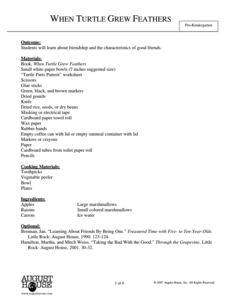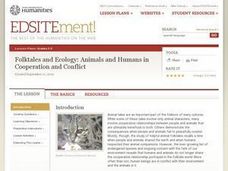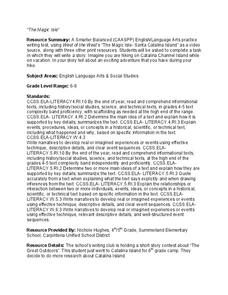Curated OER
What Are We Reading for Again?
Learners work to develop comprehension strategies. Through modeling and guided practice they develop a series of questions as they read Where the Wild Things Are. They apply these questions to find answers about the text and make...
Ohio Department of Education
Observe Then Infer
To develop their skill at drawing inferences from observations, sixth graders rotate through six stations, conduct a series of experiments, make observations, and draw inference from what they observe.
National Park Service
A Tale of Two Men
Theodore Roosevelt and the Marquis de Mores were both born in 1858, and both came to the Dakota territory in 1883, but they influenced the developing country of America in different ways. Elementary and middle schoolers apply written and...
August House
Anansi Goes to Lunch - Kindergarten
Greed is the theme of the West African folktale, Anansi Goes to Lunch and this multidisciplinary collection of lessons. First, scholars listen to a read aloud and participate in a grand conversation about the book's key details and...
CPALMS
Analyzing Vonnegut's View of the Future and His Commentary on the Present in Harrison Bergeron
Kurt Vonnegut's short story "Harrison Bergeron" engages adolescents with its theme about the dangers of complete societal equality. Learners complete a graphic organizer to track literary elements in the story, as well as an inference...
August House
The Pig Who Went Home on Sunday
Turn your classroom into a pig sty with a instructional activity based on the Appalachian folktale The Pig Who Went Home on Sunday. Similar to the story of The Three Little Pigs, the folktale tells a story of four pigs who leave...
Science 4 Inquiry
The Ups and Downs of Populations
Life has its ups and downs ... especially if you're an animal! Biology scholars engage in a population study through an inquiry-based lesson. Pupils work together to explore the factors that affect deer populations, then examine the...
Prestwick House
Vocabulary in Context: Wilderness Survival
Do you have what it takes to survive in the wilderness? A high-interest reading passage offers practical advice while incorporating vocabulary practice. Follow-up worksheets focus on skills such as defining words, making inferences, and...
August House
When Turtle Grew Feathers
Friendship is a valuable part of growing up. Learn about the importance of friendship with a variety of activities based on When Turtle Grew Feathers by Tim Tingle. Kids practice making musical instruments, discussing plot points,...
EngageNY
Establishing Structures for Reading: Gathering Evidence about Salva’s and Nya’s Points of View (Reread Chapters 1 and 2)
Readers practice gathering textual evidence to support their understanding of character point of view in A Long Walk to Water by Linda Sue Park. Working with partners, they complete a Gathering Evidence graphic organizer and engage in...
Curated OER
Inferring Themes
Fifth graders practice making inferences on various types of reading material. As a class, they develop a definition of the word "theme" and discuss themes for some of their favorite stories. They use the context of the reading...
Curated OER
Inferences/Opinions
Fourth graders practice making inferences and forming opinions. In this reading strategy lesson, 4th graders listen to the book Woodsong by Gary Pauisen. They make predictions about the story before beginning and discuss the story...
Curated OER
Stone Soup
First graders examine the use of logic, deduction, and inference to determine the answers to riddles. They listen to a teacher read aloud of Heather Forest's, Stone Soup before discussing the story which gauges their comprehension....
Curated OER
Folktales and Ecology: Animals and Humans in Cooperation and Conflict
Story elements such as conflict, character analysis, resolution, and moral are discussed and charted as elementary children read folktales involving animals. An element of science is also introduced as learners discover what a keystone...
Curated OER
Philanthropic Literature: Quilt to Freedom
A reading of Sweet Clara and the Freedom Quilt by Deborah Hopkinson launches this study of slavery, freedom, and the Underground Railroad. After a discussion of the importance of showing respect for others and of helping each other in...
Curated OER
Knights of the Round Table adapted by Gwen Ross
Everyone loves the tales involving King Arthur and his knights. After reading Knights of the Round Table by Gwen Gross, learners draw inferences and conclusions, analyze story elements, and discuss figurative language, including...
Curated OER
Esperanza Rising - Literature Circles and Review (Day 3)
Kids love working with their peers. Get your class into small literature circles and have them complete weekly assignments. Before beginning this week's activity, have each learner write a letter from Esperanza in California to Abuelita...
Curated OER
Sadako and the Thousand Paper Cranes
Have your class explore the effects of war by reading Eleanor Coerr's story, "Sadako and the Thousand Paper Cranes." This is a story about a sixth grader who lives in Hiroshima when the atomic bomb is dropped. Learners answer questions,...
EngageNY
Analyzing Point of View: Inferring about the Natural Disaster in Eight Days
Who is telling the story? Readers take a look at the text Eight Days to determine if the story is told in first or third person. They then discuss in groups and complete a shared writing activity to describe how the narrator's point of...
National Endowment for the Humanities
“Every Day We Get More Illegal” by Juan Felipe Herrera
A study of Jan Felipe Herrera's poem "Every Day We Get More Illegal" opens the door for a discussion on immigration. To begin, class members examine the photograph "Desert Survival," record their observations of the image, and then...
Channel Islands Film
Magic Isle: Lesson Plan 3
Middle schoolers complete a writing assessment task to demonstrate their ability to craft a narrative based on a variety of informational texts. They view West of the West's documentary Magic Isle, read three print resources about...
Eastconn
Women of the California Gold Rush
The California Gold Rush was not just an opportunity for the male gold miners sifting for shiny nuggets. Small groups read accounts of the ways women took advantage of the influx of workers to run hotels, bake pies, and wading out into...
NASA
The Big Climate Change Experiment Lesson 3: Climate Change Lines of Evidence
Consider the preponderance of evidence when making a verdict. The third of five lessons in Unit 1: The Big Climate Change Experiment focuses on the evidence for climate change. Learners study graphs, diagrams, and pictures regarding...
Curated OER
Inference By Analogy
Students infer the use or meaning of items recovered from a North Carolina Native American site based on 17th-century European settlers' accounts and illustration.

























